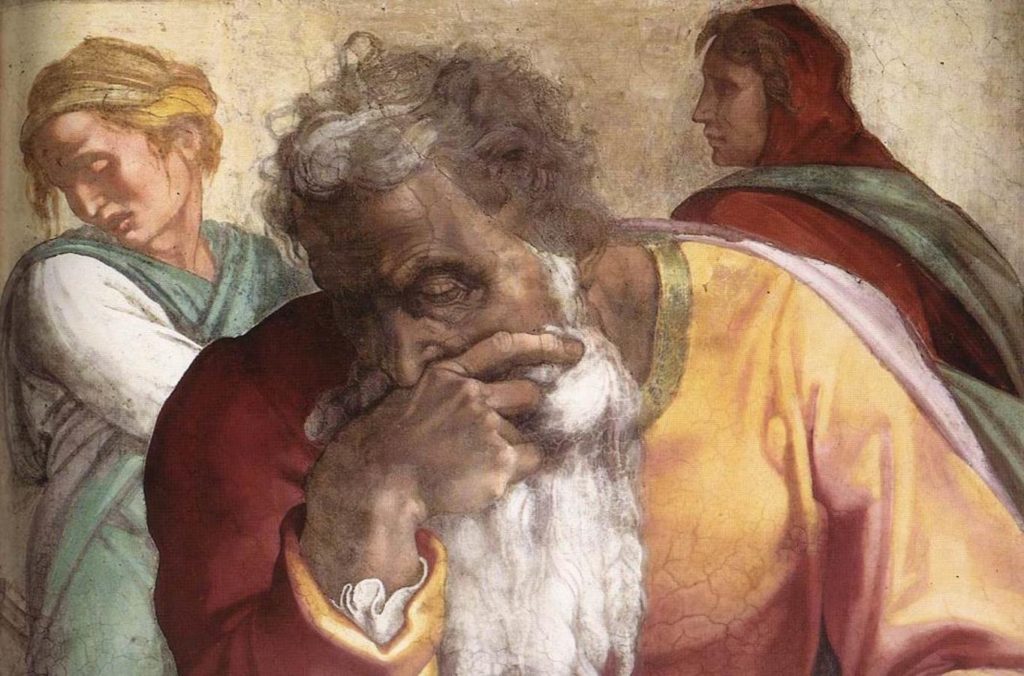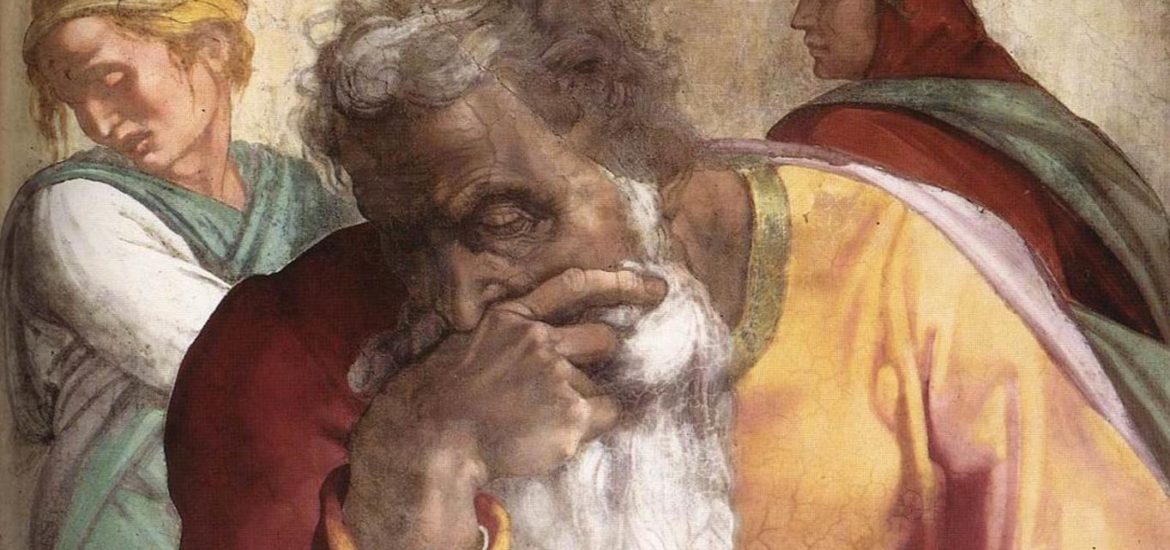
Jeremiah the Prophet
Devotions on Jeremiah 32: 1-3a, 6-15
Sixth Sunday after Pentecost
Monday, Jeremiah the Prophet
“Why do you prophecy and say: ‘Thus says the Lord. I am going to give this city into the hand of the king of Babylon’” (Jeremiah 32:3a).
The Babylonian army had surround the city of Jerusalem. Food and other supplies could not get through the blockade, which had been set up. The people of Jerusalem were starving and dying. Jeremiah spoke the word of the Lord to the king and the people. It was a harsh word that proclaimed the defeat of Jerusalem; God was not going to come to their rescue. The king was upset. He didn’t want to hear what Jeremiah had to say.
There are times when we are much like King Zedekiah. We too don’t want to hear the truth. (Especially when it involves our dark side—the side we want to deny and we think people can see.) Our loved ones may tell us that we drink too much and it is hurting our relationship with them. A co-worker may share that our insensitive, homophobic comment offended several people in the office. Fellow parents at our children’s sporting event may tell us that our angry outbursts are not welcomed.
Our first reaction is to become defensive and deny the validity of what we are being told. We turn a deaf ear, close our minds and harden our hearts to the words—even though they are spoken to us by people who love and care about us. Refusing to listen doesn’t negate the truth, though. We are challenged to stop following Zedikiah’s example and instead prayerfully seek to hear what the Lord wants to say to us. It may be difficult to listen to messages the Spirit of the Lord wants to share with us, but God’s words always lead to light and life.
We will never be perfect, Lord, but we do pray that your Spirit will constantly work in our lives to change us into your image. Amen.
Tuesday, Jeremiah the Prophet
“The word of the Lord came to me” (Jeremiah 32:6).
The life of faith was never meant to be confined to a set of beliefs. Rather it was always centered on a relationship and a lifestyle. The Father and the Son sent the Spirit to be present in our lives and to continue the relationship freely offered to all people. Jesus promised his disciples and future followers to be with us always (Matthew 28:20). Living a sacramental lifestyle—with God in, with, under us—we follow his commandment to love one another as we have been loved (John 15:12).
One of the ways we live in our relationship with God is to hear God speak to us. God may use the words of the Bible, our pastor, our friends, and sometimes even our adversaries. The Spirit moves within us to comfort and inspire, to guide and correct, and to affirm and celebrate.
We are not alone. God is with us and we are a part of God’s family.
Thank you, Lord, for you presence and power in our lives. Amen.
Wednesday, Jeremiah the Prophet
“Buy my field that is at Anathoth” (Jeremiah 32:8).
Jeremiah’s cousin was going to sell some land. There were laws on the books that gave family members the option to purchase the land before the land could be sold out of the family. The purpose was to insure that the land stayed with the family. The laws also hindered “land barons” from building an empire. There were other laws and traditions, such as the year of Jubilee when all land was supposed to transfer back to the original family, which sought to ensure a financial equality in Israel society. One aspect of God’s vision of heaven on earth is where no one has extra and everyone has enough.
We are all recipients of God’s love and grace. As followers of Jesus, we celebrate the truth by not hoarding what we have been given, but rather by sharing it so that other’s needs are met. Today we not only can pray, meditate, read Scripture, and worship, we can also give the hungry food, the thirsty water, welcome the stranger, care for the sick, and visit those imprisoned (Matthew 25:34-36).
As the Psalmist has written, “This is the day that the Lord has made. Let us rejoice and be glad in it” (Psalm 118:24).
Lord, move in our hearts that we may share the great wealth and blessings that you have given us. Amen.
Thursday, Jeremiah the Prophet
“I knew it was the word of the Lord” (Jeremiah 32:8).
As followers of Jesus, we want to be where the Lord wants us to be, doing what the Lord wants us to do. Jesus did tell his disciples to follow him. We like to think that the Holy Spirit is leading us and enabling us to do just that.
Jeremiah believed that his vision of the Lord’s leading was confirmed when it came to pass. The Lord had told him that his cousin was selling the land. A short time later his cousin came to him asking him to purchase the land.
The Spirit of the Lord leads us in many ways. Sometimes circumstances determine our path. At other times the Spirit speaks to us through the words of our friends or community. It has been known for the Spirit to even use gut feelings. As we seek to discern God’s leading, we can rejoice that the Lord has chosen to use us to share God’s love and grace with those around us and to proclaim the gospel of Jesus Christ in word and deed.
Lord, we are tools in your hand. Use us. Amen.
Friday, Jeremiah the Prophet
“In the presence of all the Judeans who were sitting in the court of the guard” (Jeremiah 32:13).
Many of us have grown up in faith communities where we proudly didn’t wear our faith on our sleeves. I think this was a reaction to self-righteousness that infects many Christians in all sizes and shapes. You know the kind, “I’m better than other Christians because I: (Fill in the Blank) Pray more than you do, Give more than you do, Read the Bible more than you do, Have taught Sunday school for seventy years and hated every minute of it.
The truth be told, though, you can’t be a secret follower of Jesus. (Though you can pray in a closet instead of on a street corner.) Jeremiah lived out his call as a prophet before all of the Judeans sitting in the court of the guard. We can openly follow Jesus and be humble—living in gratitude for God’s overwhelming love and grace in our lives.
Our service will take on as many different forms as there are followers of Jesus. Some of us will serve as Sunday school teachers—and love it. Others might be gifted in being sensitive and empathetic to the needs of their co-workers. Still others will serve at soup kitchens, food pantries, shelters, or pack care packages for military personnel.
Openly we serve. Openly we proclaim God’s love and grace—and we do so by both our words and our actions.
Empower us to be bold, courageous and love as we share your love and grace with others. Amen.
Saturday, Jeremiah the Prophet
“Put them [the land deeds] in an earthenware jar that they may last a long time” (Jeremiah 32:14).
Impatience is one of a number of universal sins. We don’t want to wait. Instant is too long. Fast food is too slow. We don’t save for a car or a vacation. Instead we buy it on credit, enjoy it for the moment and then pay for it for years with high interest rates. It has been said that, “Patience is a virtue.” We believe it is an inconvenience.
There is a lesson to be learned from the land deeds in an earthenware jar. It was a lesson that the people of Israel needed to learn, and most certainly we need to learn it too. The lesson is that God moves in God’s own time. On many occasions, God moves over the years, decades and centuries, while God’s people wait. Rarely does God provide us with an explanation.
God’s promises are sure. They are worth waiting for. In the meantime, we don’t keep our noses stuck in our cell phones playing games or following the local gossip. Instead, we live openly as followers of Jesus and share God’s love and grace with those around us.
Lord, we confess that we are an impatient people. Give us the ability to wait patiently and to love our neighbor while we wait. Amen.
Sunday, Jeremiah the Prophet
“Houses and fields will again be bought on this day” (Jeremiah 32:15).
The people faced an uncertain future. The Babylonian army was outside Jerusalem’s walls. Soon soldiers would break down the walls, invade Jerusalem, kill, maim and take the people captive. Eventually the people would be exiled to Babylon. The Israelites didn’t know what the future held. It looked hopeless.
God gave the people a message of hope through God’s prophet, Jeremiah. Jeremiah had purchased the land. The deeds were put in a clay pot and buried. They would be safe for decades. There would come a time, though, when those clay pots would be dug up. The people would return from their exile and inhabit the land once again. At that time, houses and fields would be bought and sold again.
God is not silent nor still. God is moving in ways that we cannot detect nor can we understand. While we wait, though, God has given us a great gift. God has given us hope. Through the life, death and resurrection of Jesus, there is hope.
Thank you Lord, for you gift of hope. Amen.

